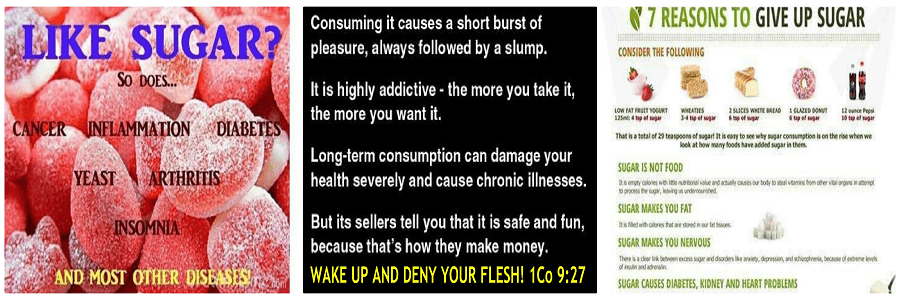
Sugar is Deadly
Sugar is eight times as addictive as cocaine. It causes and feeds cancer. It causes autism in many younger children. Many studies have brought to light the causes and possible treatments for autism, but mainstream physicians or scientists ignore ignore most of this data.
In 1800, the average person consumed the same amount of sugar in one year as the average person currently consumes in one month. This amount of consumption has resulted in nearly 70 percent of Americans becoming overweight. Kids are worse and it’s nothing short of child abuse! They consume about 34 teaspoons of sugar a day. Forty percent of our youth are overweight, and one quarter is either diabetic or pre-diabetic.
Added sugar is the result of “man” (factory processing which involves bleaching and crystallization). It is actually broken down into two simple sugars – glucose and fructose. Glucose is naturally occurring in our bodies, and every living being uses glucose for energy. Fructose, on the other hand, is not produced (in any significant amount) by humans and is not needed in our diet. When you eat a piece of fruit, the fructose from the fruit will turn into glycogen and be stored in the liver until we need it. But if you eat a large amount of processed sugar, the fructose will overload the liver (your liver is now full of glycogen), and the liver will force the fructose to turn into fat. This fat will go to your stomach, your thighs, and all over your body.
The causes of mitochondrial dysfunction are well known, specifically as it relates to metabolism and the brain. They include environmental toxins(iv)—mercury, lead and persistent organic pollutants(v)—latent infections, gluten and allergens (which trigger inflammation) SUGAR AND PROCESSED FOODS,(vi) a nutrient-depleted diet (which sugar cabn cause),(vii) and nutritional deficiencies.(viii) These are all potentially treatable and reversible causes of mitochondrial dysfunction that have been clearly documented.
Cells of the brain and muscle are among those that require a lot of energy so they have a particularly high density of mitochondria to support their energy needs. When mitochondria aren’t working well, these are often the parts of the body to show signs of poor function. When mitochondria are not functioning well, a wide variety of symptoms can emerge, including:
- Developmental delay or regression
- Language impairment
- Social impairment
- Intellectual disability
- Neuropsychiatric symptoms (ASD, ADHD, anxiety, OCD, depression)
- Seizures
- Headaches
- Hearing impairment
- Weakness
- Small stature
- Fatigue
- Gastrointestinal symptoms
- Endocrine disturbance
- and many others
More and more research now suggests that mitochondrial dysfunction may be important in many different health conditions:
- Autism
- Bipolar disorder
- Schizophrenia
- Depression
- Diabetes
- Parkinson’s disease
- Asthma
- Chronic fatigue syndrome
- Alzheimer’s disease
- A variety of gastrointestinal disorders
- And others…
Mitochondrial dysfunction and Autism Spectrum Disorder
Research in mitochondrial dysfunction in ASD has grown in recent years, and there are now many research studies linking mitochondrial dysfunction to ASD.
The information provided on this website is not meant to be used, nor should it be used, to diagnose, treat, cure, or prevent any disease or medical condition. This information has NOT been evaluated by the FDA. This website is not intended as a substitute for the medical advice of a physician. The reader should regularly consult their doctor in matters relating to his/her health and particularly with respect to any symptoms that may require diagnosis or medical attention.
Neither Eternal Evangelism or its owner are responsible for any specific health needs that may require medical supervision and are not liable for any damages or negative consequences from any treatment, action, application or preparation, to any person reading or following the information on this website. References are provided for informational purposes only and do not constitute an endorsement of any websites or other sources. Readers should be aware that the resources listed may change.

